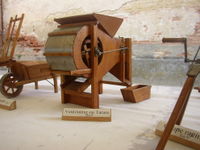Wind winnowing
- Wind winnowing
-
Van (agriculture)

Pour les articles homonymes, voir
Van.
Le van est un outil agricole dont on se servait autrefois pour nettoyer les céréales. c'était un panier très plat et large servant à séparer la paille, la balle et la poussière du bon grain en les projetant en l'air d'un geste alerte pour offrir au vent les parties les plus légères à éliminer.
Son origine est aussi vieille que l'agriculture, c'est-à-dire du néolithique.
Il était généralement confectionné d'un tressage de paille, d'osier, de branches de châtaignier refendues, etc.
Il a été mécanisé pour prendre la forme du tarare, machine désormais obsolète qui a été intégrée dans la batteuse puis dans la moissonneuse-batteuse.
 Portail de l’agriculture et l’agronomie
Portail de l’agriculture et l’agronomie
Catégorie : Outil agricole
Wikimedia Foundation.
2010.
Contenu soumis à la licence CC-BY-SA. Source : Article Wind winnowing de Wikipédia en français (auteurs)
Regardez d'autres dictionnaires:
Winnowing — Wind winnowing is an agricultural method developed by ancient cultures for separating grain from chaff. It is also used to remove weevils or other pests from stored grain. Threshing, the separation of grain or seeds from the husks and straw, is… … Wikipedia
Winnowing barn — Winnowing barns (or winnowing houses) were commonly found in South Carolina on antebellum rice plantations. A winnowing barn consists of a large shed on tall posts with a hole in the floor. Raw, husked rice was carried up into the barn by workers … Wikipedia
Winnowing — Winnow Win now (w[i^]n n[ o]), v. t. [imp. & p. p. {Winnowed} (w[i^]n n[ o]d); p. pr. & vb. n. {Winnowing}.] [OE. windewen, winewen, AS. windwian; akin to Goth. winpjan (in comp.), winpi skauro a fan, L. ventilare to fan, to winnow; cf. L. wannus … The Collaborative International Dictionary of English
winnowing — The process of hurling threshed grain into the air with a kind of fan; the wind separated the valuable grain from the chaff (Ruth 3:2) so that it could be stored. It was John the Baptist s metaphor for the divine judgement [[➝ Judgement]] (Luke 3 … Dictionary of the Bible
On the wings of the wind — Wing Wing, n. [OE. winge, wenge; probably of Scand. origin; cf. Dan. & Sw. vinge, Icel. v[ae]ngr.] [1913 Webster] 1. One of the two anterior limbs of a bird, pterodactyl, or bat. They correspond to the arms of man, and are usually modified for… … The Collaborative International Dictionary of English
Matthew 3:12 — Jean François Millet s depiction of winnowing Matthew 3:12 is the twelfth verse of the third chapter of the Gospel of Matthew in the New Testament. The verse occurs in the section relating the preachings of John the Baptist. In this he uses the… … Wikipedia
winnow — I. verb Etymology: Middle English winewen, from Old English windwian to fan, winnow; akin to Old High German wintōn to fan, Latin vannus winnowing fan, ventus wind more at wind Date: before 12th century transitive verb 1. a. (1) to remove (as… … New Collegiate Dictionary
winnow — Synonyms and related words: aerate, air, air out, air condition, air cool, airify, analyze, appraise, assess, bolt, catalog, categorize, choose out, clarifier, clarify, class, classify, clear, colander, comb, contradistinguish, cordon, cordon off … Moby Thesaurus
au̯(e)-10, au̯ē(o)-, u̯ē- — au̯(e) 10, au̯ē(o) , u̯ē English meaning: to blow Deutsche Übersetzung: “wehen, blasen, hauchen” Grammatical information: participle u̯ē nt Note: in Slav. languages often from the “ throw dice “, i.e. to the cleaning of the… … Proto-Indo-European etymological dictionary
List of Chinese inventions — A bronze Chinese crossbow mechanism with a buttplate (the wooden components have … Wikipedia
 Pour les articles homonymes, voir Van.
Pour les articles homonymes, voir Van.

